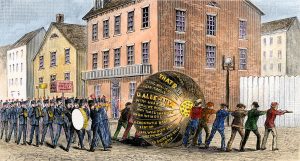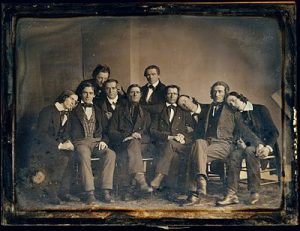 Presidential Campaign Songs
Presidential Campaign Songs
As our political system moves toward our upcoming elections and both major parties hold their conventions, join us as we explore some of the classic songs used for campaigns through the years. Before radio, TV, or social media ads dominated the campaign cycle, politicians selected or commissioned songs that would carry their message to voters around the United States. From classic campaign songs like “Tippecanoe & Tyler Too,” and “I Like Ike,” to “Roar,” and “God Bless the USA,” campaigns have commonly harnessed the power of music in delivering their message.
Why Campaign Songs?
American Ethnomusicologist Anthony Seeger posits a handful of reasons that candidates used songs in their political campaigns. In the liner notes for his curated collection, Seeger notes first that there was a long history of topical and political songs from well before the US was formed, so Presidential campaigns were just one of many topics that entertained audiences around the country.
Second, he points to how useful songs are when large sectors of the population are illiterate, and most areas of the US had little access to any form of mass media before the radio in the 20s.
Thirdly, he examines the advantage that a song has over, for example, a political pamphlet by quoting turn-of-the-20th-century labor organizer and songwriter Joe Hill: “A pamphlet, no matter how good, is never read more than once, but a song is learned by heart and repeated over and over.”
Finally, by harnessing the power of melody, rhythm, rhymes, and verse structures, songs focus listeners’ attention on easily-understood messages to aid memory.
How about some examples?
We thought you’d never ask! Let’s start with one of the earliest examples of a campaign song, one that highlights a common method for campaign songwriting: Taking a well-known melody and writing new lyrics to it. “Free and Fair Elections,” dating to around 1800, used the well-known tune “Yankee Doodle” as it’s basis. Hum the tune of Yankee Doodle and try to place the lyrics below in the verse and chorus melodies
While some on rights and some on wrongs / Prefer their own reflections
The people’s rights demand our song / The right of free elections
Law and order be the state / With freedom and protection
All stand by the ballot box / For fair and free elections
Listen below to see how it sounds!
The Harrison Yankee Doodle
The tune of Yankee Doodle was so ubiquitous that it was eventually repackaged for William Henry Harrison’s campaign! Listen to the recording made by folk artist Oscar Brand below:

Lincoln & Liberty Too
Another example of this is Abraham Lincoln’s use of the well-known Civil War-era song “Rosin the Beau (Bow).” New lyrics were written in the Hutchinson Republican Songster by Jesse Hutchinson, member of the Hutchinson Family Singers, one of the most popular singing groups of the 1840s. In addition to Jesse’s lyrics lauding Lincoln were three concluding verses on the abolition of slavery:
Come all you true friends of the nation / Attend to humanity’s call / Oh aid of the slaves’ liberation / And roll on the liberty ball
We’ll finish the temple of freedom / And make it capacious withing / That all who seek shelter may find it / Whatever the hue of their skin
Success to the old fashioned doctrine / That men are created all free / And down with the power of the despot / Wherever his stronghold may be
Find the original tune and the Lincoln version below!
Attack Ads
Not all of the melody-reimaginings were purely pro-candidate, however. Some campaigns found it useful to parody well-known tunes to the detriment of their opponents. In response to the Whig Party contrasting their candidate as rural, down-home, and relatable against the “aristocratic,” Martin Van Buren, Van Buren’s campaign rewrote lyrics to the lullaby “Rockabye, Baby.” The rewrite paints the entire Whig party as drunkards and good-for-nothings:
Rockabye, baby, Daddy’s a Whig / When he comes home, hard cider he’ll swig
When he has swug / He’ll fall in a stu / And down will come Tyler and Tippecanoe
Listen to the remarkable adaptation below: